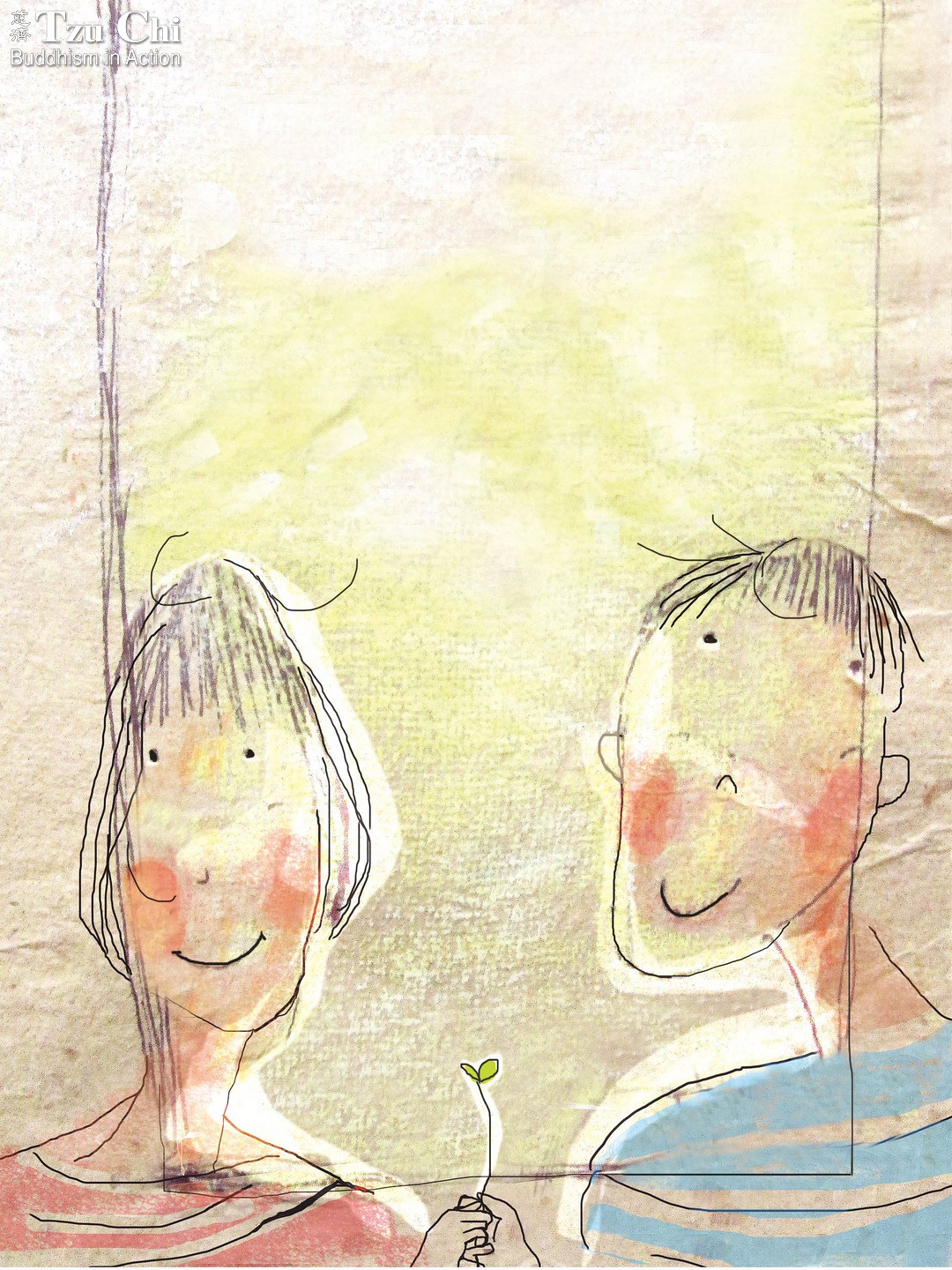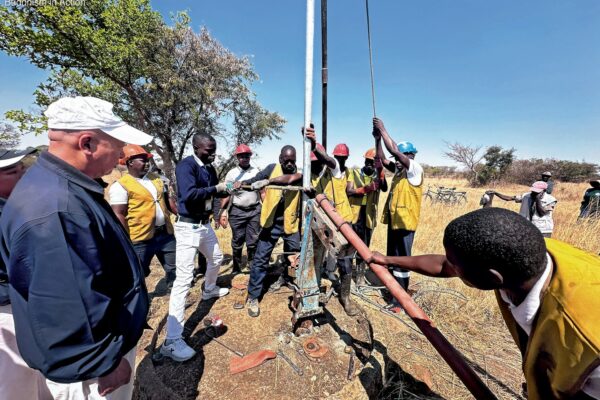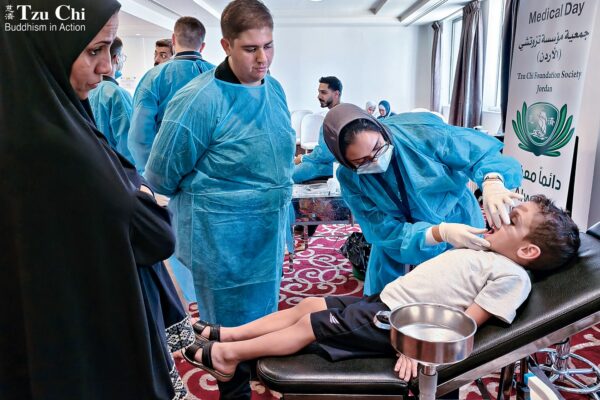By Ye Wen-ying
Translated by Wu Hsaio-ting
Graphics by Liu Jia-wen
She was not yet 40, but already near the end of her life with cancer. She had two children, both still young. Divorced and not wanting to leave her children to her alcoholic and violent ex-husband, what was she to do?

Ms. Nguyen, less than 40 years old, lay in a hospital bed, her swollen legs limp. She was severely ill with advanced cancer and could no longer walk. She knew her days were numbered, but it wasn’t those thoughts that clouded her mind. Instead, she was worried about her two children, one in junior high and the other in elementary school. Where would they go after she died?
“Alcoholic and abusive!” This is how she summed up her ex-husband. He wasn’t worth considering as an option for her kids. But to whom could she entrust them when she was no longer around?
A struggling single mom
Nguyen and her children began receiving Tzu Chi’s assistance after a schoolteacher referred the family to the foundation. Guo Shu-jing (郭淑菁), a Tzu Chi volunteer in Tainan, southern Taiwan, was helping care for the family. She had learned their story after taking on the responsibility to provide them with help and support.
Nguyen, originally from Vietnam, moved to Taiwan after she married a man on the island. Sadly, they didn’t live happily ever after; their marriage ended in divorce. Though her husband obtained custody of their children when the couple parted ways, they didn’t live with him. Instead, the young ones lived with his parents, who also took care of their daily needs. A few years later, one of the grandparents passed away and the other fell ill. Eventually, the children ended up back with their mother.
“The father was alcoholic and abusive,” volunteer Guo mused to herself. “After the divorce and gaining custody of his children, he failed to live up to his responsibilities as a father. He left the kids in the care of his parents, but that didn’t last either. When the old ones were unable to care for the kids, he let them move in with his ex-wife. He expected her to fend for them, even though her financial means were limited.” Guo couldn’t help forming a negative view of the father.
Nguyen was later diagnosed with cancer. During the terminal stage of her illness, she was often confined to the hospital. With their mom down, the kids were completely on their own. They packed themselves off to school each morning and took care of their own meals. They often spent nights at home alone.
After learning of the situation, Nguyen’s mother flew from Vietnam to Taiwan to take care of her daughter and grandchildren. She couldn’t speak Chinese, and the kids couldn’t speak Vietnamese, but they managed to communicate simply with gestures and body language. Fortunately, it wasn’t difficult to convey the meaning of essential things like eating, taking a shower, or making a phone call. The grandmother from Vietnam thus fell into a daily routine of caring for her daughter at the hospital during the day and spending time with her grandchildren at night.
The family, however, soon began to falter under financial burdens. Nguyen’s illness had prevented her from working, and with her savings draining away, paying the rent and living expenses became a challenge. Guo and other volunteers visited the family to assess their needs after their plight was brought to Tzu Chi’s attention. The foundation promptly began providing the family financial aid to help see them through their difficulties. But Guo knew they needed more than monetary assistance. Another pressing issue was to decide with whom the children could live when their mother was no longer around.
Father or grandmother?
What did the two children think of their father?
The daughter, who by that time was a teenager, had no love lost for her father. This was likely due to her mother’s influence. Her dislike for him was written all over her face whenever the topic came up. The son, still in elementary school, let his sister take the lead on this issue, but his feelings didn’t run quite as deep or as negative as hers.
One day, the boy fell ill with a fever. The doctor who treated him prescribed a week’s rest at home for him. But how could that happen? It was impossible for the grandmother to be two places at once, caring for her daughter at the hospital and for her grandson at home. With no other choice, Nguyen phoned her ex-husband and asked him to go to her home and tend to their son.
Guo found this surprising and was worried for the children. She thought to herself, “How can a father like that properly care for his son? Will the kids even be safe with him?” The husband had been physically abusive towards Nguyen, so Guo was naturally concerned that he might get drunk and become abusive towards his children too. Having never met the father, all Guo knew of him was based on his wife’s description of him, and the picture Nguyen had painted of her husband had been quite negative.
Guo was uneasy all that week. She wondered if Nguyen was just as worried as she was. Did Ngyuen really have no other choice but to turn to her ex-husband for help? Or, was it perhaps that her ex wasn’t all that bad?
The week eventually passed, and the son, having regained his health, returned to school. Guo heard afterwards that the daughter would glare at her father every day that week when she returned home from school before quickly retreating and locking herself in her room. But other than that, nothing untoward happened. There was no physical abuse, and the father and daughter avoided a major clash.
Knowing that she wouldn’t be around for long, Nguyen began making final arrangements. She told her mother she wanted to be cremated after she died and her ashes taken back to Vietnam to be buried there. As for her children, she wanted them to accompany her ashes to Vietnam and then stay there permanently instead of returning to Taiwan.
When Guo learned what Nguyen had envisioned after her passing, she wondered whether her plan would work. Even if the kids agreed to go to Vietnam with their grandmother and live there, would their Vietnamese relatives kindly accept them into their lives and help care for them? And what about the language barrier? Unable to speak Vietnamese, how would the kids be able to attend school in Vietnam? More than anything, that would have a negative impact on their future prospects.
Guo raised her concerns with Nguyen and mentioned the thorny legal issues involved. She said, “Your ex-husband has to first renounce custody if your children are to go to Vietnam with your mother to live there.”
“If he doesn’t agree to my plan, we’ll flee before he can do anything!” Nguyen threatened in response.
“But if you flee, the kids will end up with no legal identities in Vietnam. Even more so than the language barrier, that will negatively affect their schooling and future employment prospects,” Guo said.
That said, Guo knew that if Nguyen was to take a sudden turn for the worse and pass away before the matter was settled, the kids would probably end up with their father—that is, if there was no solid proof that he would be unsuited to his role as a father. But would ending up with their father be the best for the kids? Guo felt that if Nguyen died before the matter was satisfactorily resolved, she wouldn’t be able to go in peace.
Guo made frequent visits to the hospital and to the kids’ schools as she continued to care for the family and tried to help them work out a solution. She asked Nguyen’s friends and government social workers their opinions on the issue too. She even consulted a free legal counsel provided by the court.
Meanwhile, she reminded Nguyen to prepare the kids for her eventual passing and to encourage them to learn to take better care of themselves. One day, Guo sounded the kids out by asking, “If one day your mom was no longer around, would you like to move in with your dad?” The kids burst out crying at the same time in response, throwing her for a loop.
The daughter was unhappy with her father because she felt he didn’t value her because she was a girl. He had punished her several times before on account of something trivial. She was so mad at him she had left home several times when she was still in elementary school. It’s no wonder she felt strongly against living with him.
After seeing the children’s reactions, Guo pondered if there were other options. Since there were not many foster families in Taiwan, perhaps well-run institutions that took in young people were a possibility?
Then, one day, a schoolteacher passed on a bit of advice to her: “Don’t just listen to one side of the story.”

Seeking out the husband
Guo thought that advice made a lot of sense. After all, all that she and the other volunteers had learned about the family was just “one side of the story.” With the best interests of the children at heart, she decided to seek out the father and hear his side of things.
Guo decided to go straight to his place to talk to him, and she didn’t even phone him first to arrange for the visit. She wanted to catch him off guard so that she could get a better picture of what he was like. He might not be home, and she might come away empty-handed, but that possibility didn’t deter her. She could just make another visit.
The father lived in a house in a small town. When Guo arrived at the place, she smelled the aroma of cooking. He had just finished fixing his lunch. When he learned why Guo had come, he agreed to talk to her—but only through the screen door.
During their conversation, Guo learned that even though his daughter had been cold to him when he last spent a week with them, he had visited them again later to persuade them to move in with him. But to his great disappointment, his daughter turned him down outright. He was thus very surprised that a stranger had arrived on his doorstep to talk to him about their situation.
“Nguyen will probably be gone soon,” Guo said to him. “How about visiting her at the hospital and talking things over with her? It will help her go in peace.”
She continued: “You probably don’t know what to say to your wife and children. If you want, I can be there to help out.” She suggested to him that this might be a good chance for reconciliation. He could apologize to his ex-wife in front of his mother-in-law and children, thank her, and say goodbye to her. His visit might even bring him and his children closer together.
Guo could tell that the man wasn’t opposed to her suggestion. Through the screen door, she could see that his home was quite tidy. His ability to cook impressed her too. She could also sense that he seemed honest and down-to-earth. Though his speech wasn’t refined, he didn’t look a bit like an alcoholic idler.
What surprised her the most was that he admitted to having a drinking problem, but he said it was in the past. He had quit drinking on a doctor’s advice when he started having health problems. He had been making a decent living by farming on a piece of family land for several years now.
Guo’s visit to the man allowed her to hear the other side of the story. It also helped her realize that he wasn’t what he used to be. She realized this could be a turning point.
Guo had heard Nguyen say before that her brother-in-law had been very nice to her and the children and had helped them a lot, so she decided to speak to him too. She phoned him, told him how Nguyen’s illness had progressed, and put out feelers to find out what he thought about the children’s future custody issue. The brother-in-law said that he’d respect his brother’s decision on that matter and do his best to help him care for his children.
Guo subsequently set up a date on which the father and his brother would come to the hospital to meet Nguyen, the children, and the grandmother.
Reunion
By that time, Nguyen had been moved into the intensive care unit. She had been placed on a ventilator and couldn’t speak. However, when she learned that her ex-husband was coming to visit her, she appeared agitated. She eventually settled down, but it took a while.
“My mother-in-law has always been very nice to me,” said the father when he came to Nguyen’s bedside and saw his former in-law. The two nodded at each other and smiled. Guo thought that if the man had really treated her daughter that badly, the atmosphere wouldn’t have been like this.
“We all make mistakes,” Guo started. “Let’s not focus on the past. Whatever a person was like, he could become a different man. Your dad has quit drinking and is now leading a normal life. He keeps his house clean and tidy. Smile and call him ‘daddy,’ will you?” Guo put her arms around the children and gently encouraged them. The daughter, shy by nature, looked uncomfortable at first, but eventually did as Guo suggested.
When Guo had met the children’s uncle and father earlier, they had explained to her why Nguyen had accused the father of being physically abusive. Their explanations helped her realize that things were never simple. Life was not black and white. In a nutshell, personality clashes had led to their unhappy life together and the eventual demise of their marriage.
Surprisingly, Nguyen’s ex-husband had visited her several times in the hospital, and had even brought her things she liked to eat. He had tried to extend an olive branch. His face, tanned from working outdoors under the sun, clearly showed that he felt sorry and helpless about what had happened between him and his wife.
Guo guided the adults and children in the ward to hold hands. She encouraged them to forgive and thank each other. Nguyen’s eyes were clear and steady, indicative of a lucid mind. At this crucial moment, she agreed by nodding her head to let her children live with their father after she passed on.
Three days later, she departed from this world. She left with her mind at peace. Guo had a long talk with Nguyen’s mother afterwards with the help of a Vietnamese friend of Nguyen’s, who interpreted for them. The mother said that she’d do as her daughter had asked and take her ashes back to Vietnam to be buried there. She also said she was happy to entrust her grandchildren to the care of her former son-in-law.
After the children moved to their father’s town, Guo phoned the daughter to check on them. The daughter told her that they were adjusting pretty well to their new life with their father and with their uncle’s family, who lived nearby. Guo was happy to hear that. Because the father was able to earn a stable living, the family no longer needed financial aid from Tzu Chi. But volunteers living in the same area as the family would take over from Guo and continue visiting the family to offer emotional support.
Reflecting on the time she had served the family, Guo was pleased the matter had come to a satisfactory ending. And she felt she had learned a lot. Most of all, she had learned the importance of looking at things from different angles. She had learned that to fully understand something, especially something as complex as a human relationship, one has approach it with an open mind, walk around it completely and look at it from all perspectives, and seek the truth instead of rushing to a quick judgement.



